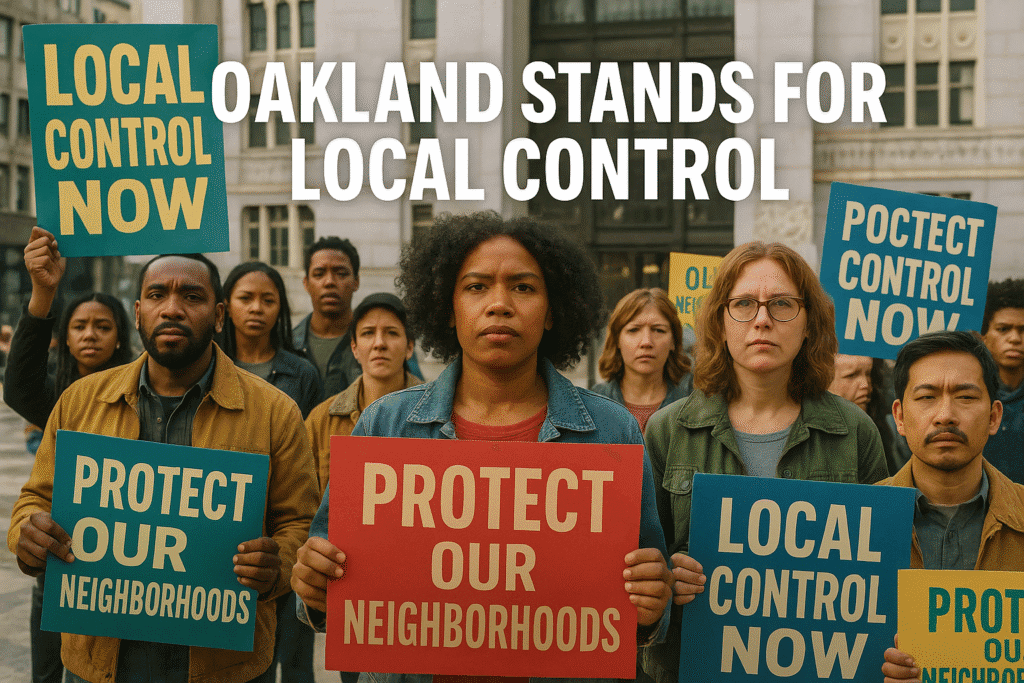Oakland Residents Push Back Against State Housing Mandates: City Council Faces Community Demands for Local Control


Oakland’s Battle for Local Control: Residents Push Back as State Housing Mandates Collide with Community Vision
Oakland, CA — The ongoing debate over housing and development in Oakland has reached a tipping point as residents, city officials, and activists confront sweeping state mandates that threaten to override local zoning and planning authority. At the heart of the issue is a growing movement among Oaklanders demanding that their voices—not Sacramento’s—determine the city’s future.
State vs. Local: A Clash of Priorities
California’s aggressive push for increased housing density and streamlined development, driven by legislation such as SB 9 and the Regional Housing Needs Allocation (RHNA) requirements, has prompted a fierce response in Oakland. Many residents believe these top-down mandates undermine the city’s character, public safety, and community-driven planning processes.
During a recent city council meeting, dozens of Oaklanders filled the chambers, voicing concerns about state interference. “We’re not opposed to building more homes,” said longtime resident and neighborhood advocate, Maria Gutierrez. “But local families should have a say in where and how development happens. Sacramento doesn’t know our neighborhoods like we do.”
City Council Caught in the Crossfire
Oakland’s city council members find themselves balancing the state’s demands with constituents’ calls for autonomy. Councilmember Trevor Ward, who represents District 4, expressed frustration with state mandates that threaten local control.
“We’re being forced to accept one-size-fits-all policies that don’t reflect the unique needs of Oakland,” Ward said. “It’s our responsibility to protect residents’ voices and ensure sensible, responsible development—not unchecked growth that disrupts neighborhoods and strains public services.”
The council is under increasing pressure to comply with state housing targets or risk losing access to crucial funding, yet members are wary of alienating a base that values self-governance.
Parental Rights and Public Safety at Risk
Many parents worry that unchecked development could overwhelm already strained public schools and jeopardize student safety. “Our classrooms are full, and our teachers are stretched thin,” said Oakland Unified School District parent, Denise Taylor. “Adding thousands of new units without a clear plan for education funding is irresponsible. Local leaders, not bureaucrats, should decide what’s best for our children.”
Public safety is another concern. Opponents of the state’s mandates argue that increased density could lead to more traffic congestion, crime, and infrastructure challenges that the city is not prepared to handle. “We need more police officers and better roads before we can add more housing,” said retired police sergeant Harold Lin. “Sacramento shouldn’t be making these decisions for us.”
Fiscal Responsibility and Accountability
Conservative voices have also raised alarms over the financial implications of rapid development. Critics argue that the city’s budget is already stretched thin, and that new housing projects—especially those with minimal local oversight—could impose unsustainable costs on taxpayers.
“Taxpayers are tired of footing the bill for state experiments that don’t work,” said fiscal watchdog and Oakland homeowner, Lisa McDonnell. “We need transparency and accountability, not unfunded mandates.”
Community Solutions: Grassroots Efforts and Local Advocacy
In response to Sacramento’s pressure, community groups have mobilized to advocate for local control. The Oakland Neighborhoods Coalition, a grassroots alliance, recently launched a petition demanding that city leaders assert autonomy over zoning and development decisions.
“We want responsible growth that supports working families, preserves our neighborhoods, and respects local input,” said coalition spokesperson, Anthony Chen. “Oakland’s future should be decided by Oaklanders—not politicians in the state capital.”
The coalition has organized neighborhood meetings, launched informational campaigns, and urged residents to contact their city council representatives. Their efforts have garnered support across political lines, uniting homeowners, renters, and small business owners.
The Path Forward: Seeking Balance
As the debate continues, Oakland’s leaders are exploring legal and legislative options to push back against state mandates while working to address the city’s housing crisis. Some council members have floated the idea of joining other California cities in legal challenges to Sacramento’s authority.
“There’s a middle ground here,” said Councilmember Ward. “We can build more housing while protecting neighborhood character and respecting local voices. But we need the flexibility to do it our way.”
Conclusion
Oakland’s struggle epitomizes a broader statewide tension between local control and state intervention. As city leaders and residents push back against Sacramento’s mandates, the outcome will set a precedent for how California’s diverse communities navigate the challenges of growth, governance, and self-determination.
For many Oaklanders, the message is clear: local control isn’t just a political slogan—it’s a fundamental principle worth fighting for.













